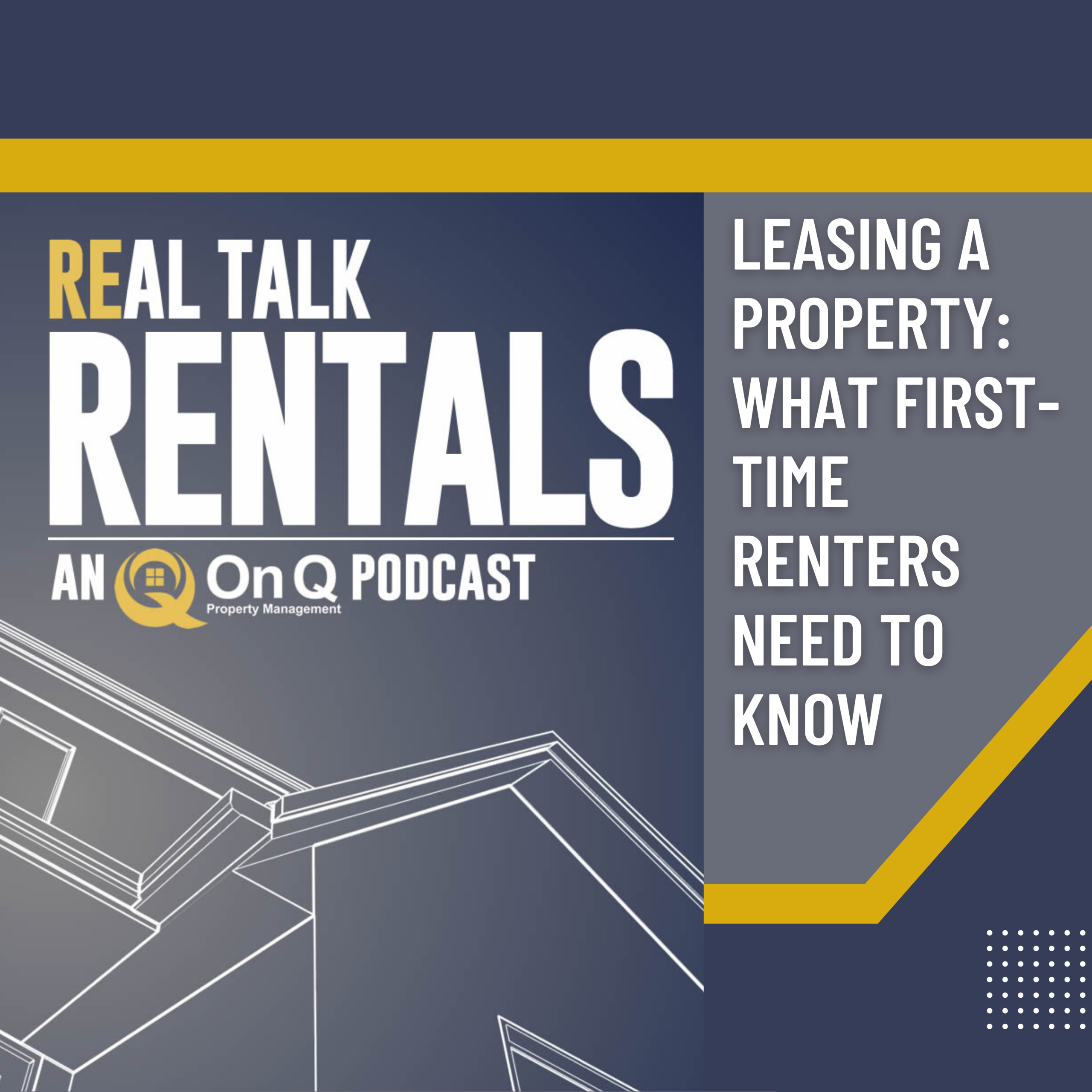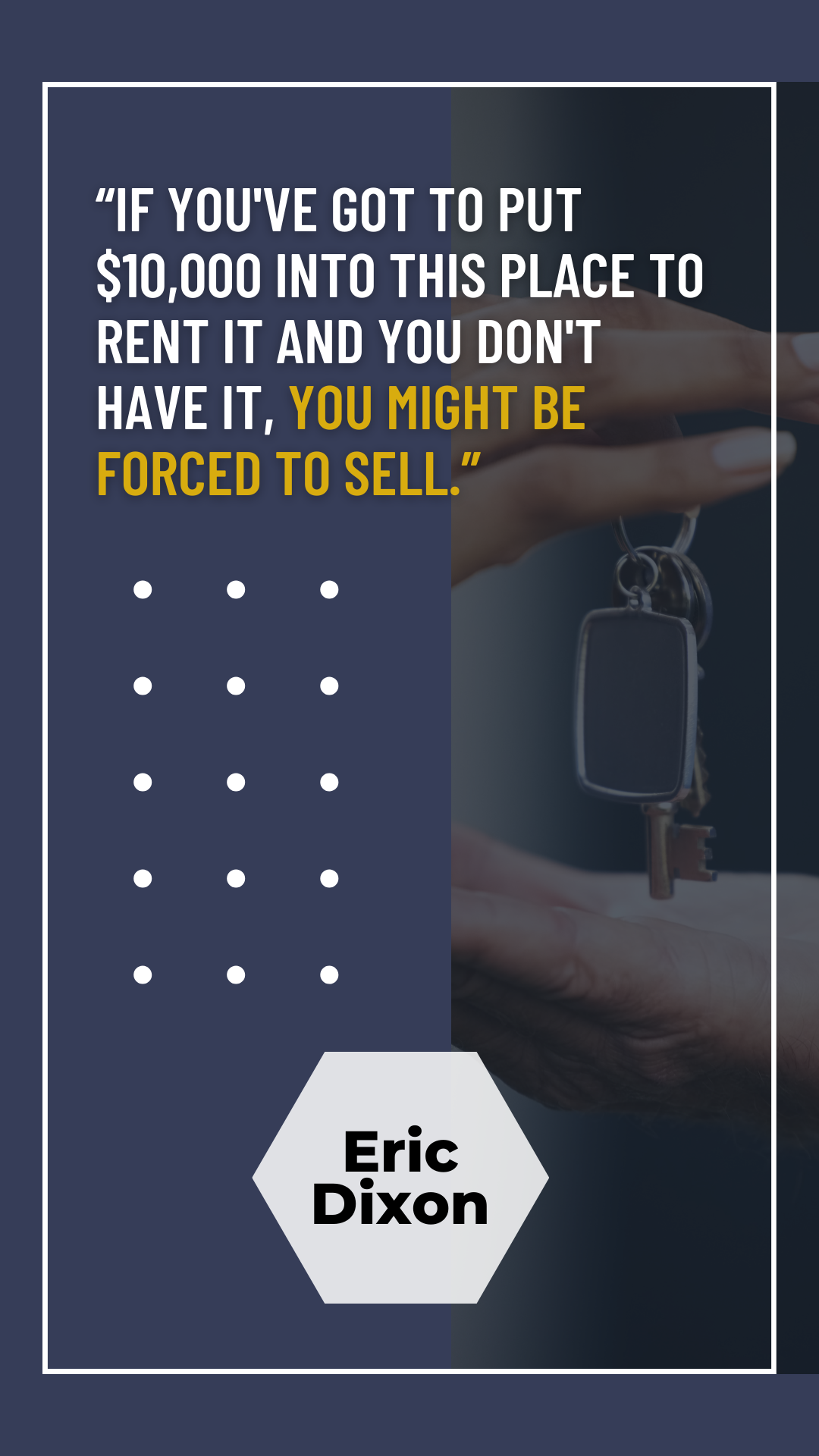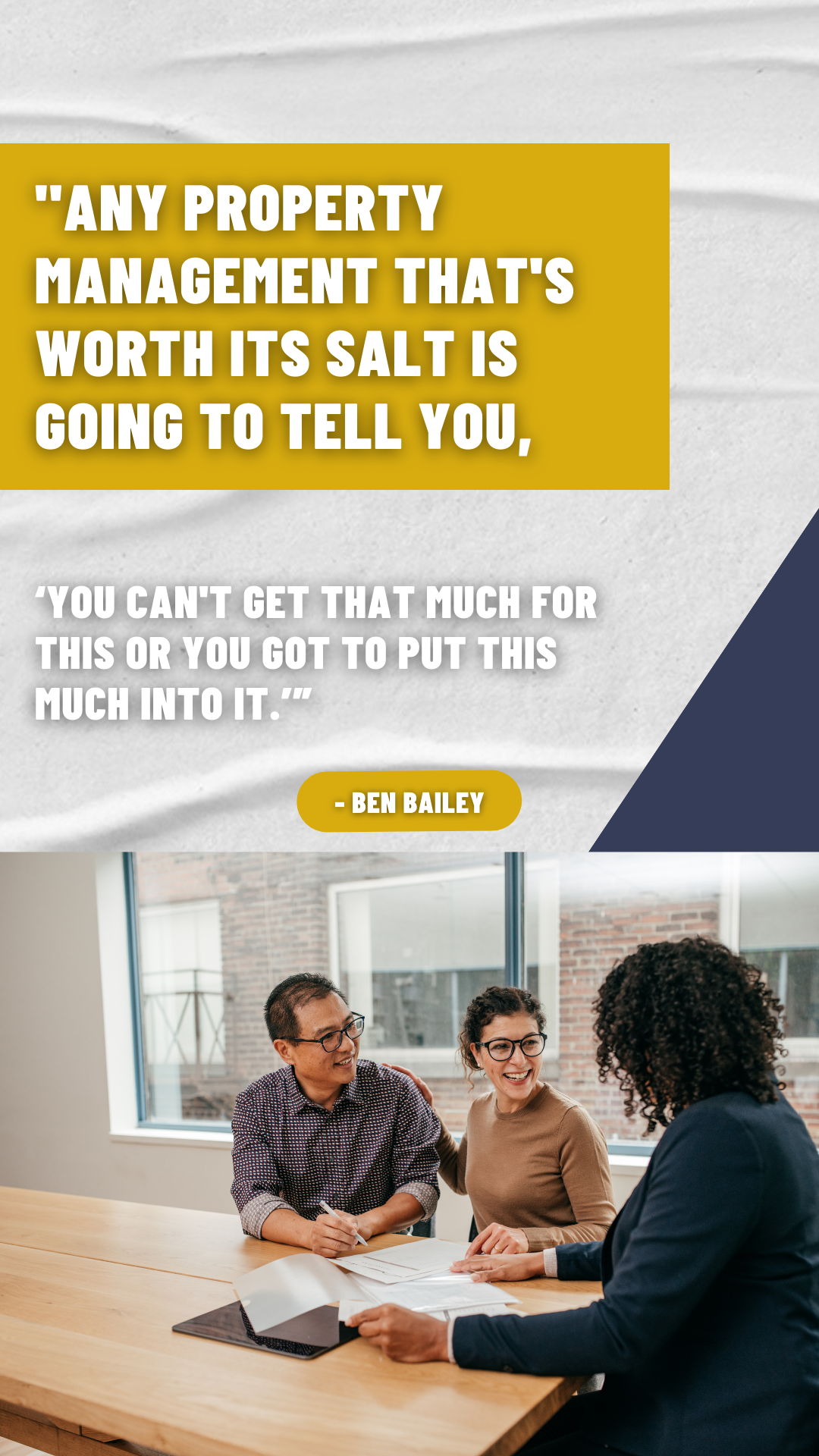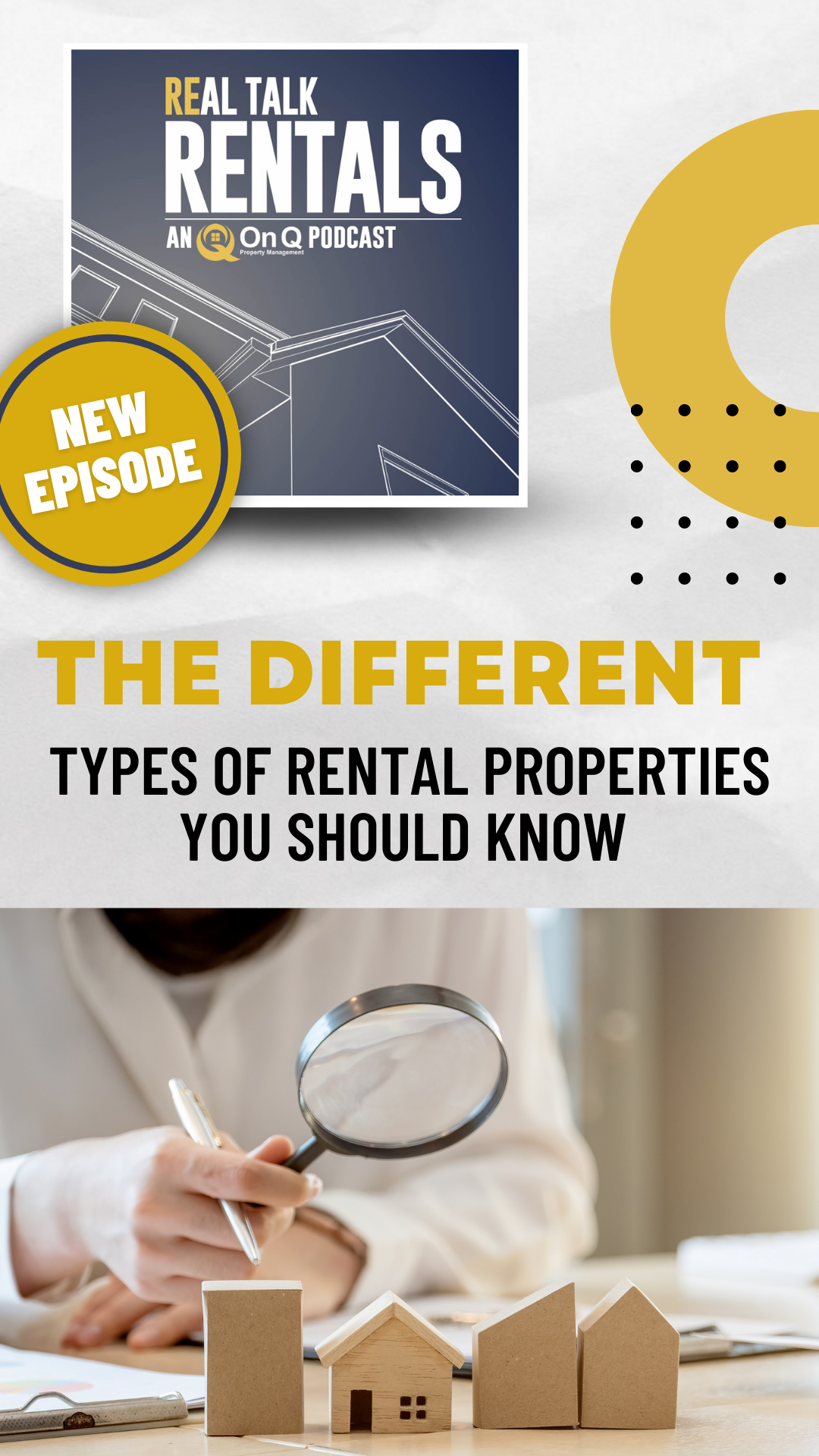REAL TALK RENTALS
Episode 20: The Different Types of Rental Properties You Should Know
Looking to generate passive income from rental properties but not sure where to start? Eric and Ben will break down the different types of rental properties available. They’ll share insights on the benefits of property management companies, including how they can save you time and money. And, they’ll delve into why investing in new homes could be the optimal choice for landlords, offering long-term benefits for both you and your tenants. Whether you’re a seasoned investor or just starting, this episode is packed with helpful tips and advice to get you on your way to building wealth through rental properties!
This episode covers:
- Rental Options
- Market Pricing
- Benefits of New Home
- Ready To Rent Home







Interested in Learning More About Property Management?
Episode Transcript ExpandThe Different Types of Rental Properties You Should Know
Ben Bailey: On today’s episode of Real Talk Rentals, we’re going to be talking about the different types of residential rental properties. Welcome back to Real Talk Rentals, a podcast brought to you by Oncue Property Management. We’re here to give you the inside scoop on everything that goes on behind the scenes in property management. I’m Ben. I’m your host, and with me, as always, Mr. Eric Dixon, the go to expert on all things property management and real estate. And in this episode, we’re going to be putting that expertise to the test. This is something we talk about every day in our business, especially when people are calling us about different situations they have. And we’re going to talk about the differences and the different types of residential rental properties, specifically what it looks like getting started with those.
Eric Dixon: Okay, great. Yeah, let’s do it.
Ben Bailey: So we’re just going to kick this off. We’ll start number one classic example. I think this is what certainly probably what we see a lot of, but also what most people think of when they think of a residential rental, which is someone lives in a home. And they’re leaving that home for whatever reason. They’re moving out of state, moving to a different neighborhood, and they decide maybe don’t sell this. Maybe I keep it as a rental. Yeah. And they pick up the phone and call friend of the pod, Matt, and say, Hey, I got this home. What do I do? And let’s start with that. What are, what are the common ways that this progresses from there?
Eric Dixon: Yeah. And common is probably a great word. So that’s probably the most common scenario, right? Is somebody lives in a home that they own. They’re raising their family or they maybe they’re outgrowing it. They’re moving out of state and now they’re considering renting it. And so part of that is, is the consideration, like, what are your options? You could move on to your next home and leave it vacant if you want to come visit, you know, if you want. Or you could rent it out or you could sell it or you could do a vacation rental Airbnb type, or you could do a um. Those are probably the most the main three. I’m trying to think in my head. Yeah, those are probably your main options. Um, and probably the most common phone call they get like, Yeah. Hey, Matt. Hey. On cue, I’m looking to rent my house. I took a job in an out of state, you know, place or I took a job that’s an hour commute away. I’m moving. How does it work? And really, we’re there to solve all their problems. Like, hey, don’t worry, this is actually very common. This is very easy for us to do. Um, part of the considerations in my mind are why would you rent versus sell, especially in a market that’s appreciated so fast over the last decade? Why would you you rent it out. Oftentimes it’s because they’re locked in a super low interest rate, right? So they say, hey, if I sell this, this asset, my two and a half to 3.5% interest rate is in the past, like that may not happen again. Right? Right. So if you have that secured and you’re you’re already years into that mortgage, um, some don’t have a choice. They have to rent it because they can’t sell their upside down.
Ben Bailey: Yeah they bought it in the market. Yeah. Went down or corrected since then right.
Eric Dixon: And we’re in an interesting time now in 2023 if you, you know, if you rewind one year and two years depending on when you bought you might be upside down. You know, if you bought six months ago, you might be upside down today. If you bought a year, year and a half ago, you’re probably in good shape. So sometimes the market dictates whether you’re going to rent it or sell it. Um, and then one thing to just keep in that consideration is what your cash flow would look like, right? You know, they’ll call us all the time, Hey, what can we rent this for? Realistically, how fast can you rent it? What are the unknown? Surprise costs. You know that people hear about the horror stories of being a landlord and we’ll kind of walk you through that. Um, funny enough, we actually have, uh, you know, a scenario kind of in motion right now. That is this exact thing, right? It’s it’s an employee moving out of state to one of our other offices, and they’re like, Hey, should I rent or should I sell? And so and they’re like, Hey, I do this every day. I work for Oncue. And it’s almost like it’s it’s very stressful, you know, it’s stressful even knowing what we’re doing. Imagine not being in property management or real estate, right? Yeah. And so they have to decide, hey, should I sell it and take that cash and move on to another state? Should I rent it and make the small amount of cash flow each month? But essentially my tenant is going to pay off my mortgage over time. Right. Um, and just realizing all those, you know, all those ins and outs and the part about it that you have to plan for. So he’s looking at things like, do I put it in an LLC? Do I put it in my trust? Should I make sure we have, you know, our family trust all set up? Um, another thing, whether it’s him or someone else, is they need to get estimates of all the stuff that needs fixed, that’s need needed fixed for years that they’ve just ignored. Right.
Ben Bailey: Yeah. And we’ve talked about this a couple of times where people just. You don’t notice because you’re living in it every day, but now that you’re leaving, you.
Eric Dixon: Just deal with it and then you’re moving and you’re like, Hey, we should probably fix this, this and this. And then you’re always like, Why didn’t we fix this years ago? It’s so much nicer now that there’s.
Ben Bailey: $5 in this door opens now.
Eric Dixon: Yeah, I’ve got a I’ve got a door that shuts on its own and I’m like, I just need to fix the hinges. And it’s been years, you know, And it’s like, you know, that’s the type of stuff that you would fix. Um, one thing that you would need to do as you’re considering these things is get estimates for those items to get your house rent ready, because maybe that will help you determine whether you should sell or rent. It’s like, hey, if you’ve got to put ten grand of cash into this place to rent it and you don’t have it, do you know what you might be forced to sell? Yeah. Or if you say, Hey, do you know what? I’ll invest the ten grand because I’m going to cash flow $500 a month for years and years and years. It could totally be worth it. Um, and then I would just say, as you’re considering this, if you are in a home and you’re considering an upgrade and renting your current house or you’re moving out of state or you fit that bill, just understand that that one transition is the hardest transition. It’s you’re moving stressful. If you got kids moving school districts, you’ve got friends, you’re leaving. Family. You’re leaving, You know, the all these things the next time it rents out. So say you hire us to manage it. It’s really stressful this first time, but next time you’re already moved on. You’re at a state, you’re at your new house, all that sort of thing.
Ben Bailey: It’s just flowing.
Eric Dixon: Now and we’re just going to take care of it. We’re going to market it. When it’s time to market it, we’re going to renew the lease. We’re going to take care of it. So if you can plan and get through this first phase, the in the future is so much easier. So that’d be my kind of $0.02 is just realize there is a. There was something at the end of the rainbow. What do they call that? Pot of gold. I don’t know. There’s hope right there, right?
Ben Bailey: Yeah. I think, too, it’s important that there’s no shame in being like, I’m not cut out for this. I don’t want to be a landlord.
Eric Dixon: Oh, yeah, Yeah.
Ben Bailey: No, you know, and some people, it takes that phone call talking through with the property. Any property management that’s worth its salt is going to tell you, you know, like, no, you can’t get that much for this or you got to put this much into it. And if you can’t do those things, there’s no shame in being like, This doesn’t work. I got to sell it.
Eric Dixon: No. And we actually so I was taking backup sales calls this week and I took a call from a awesome guy who said, Hey, my house has been on the market for 4 or 5 months. I can’t remember for $3,500 a month. And I’m like, Dude, that’s got to be a crazy nice house. Anyway, I sent sent the sales people over there. It was fun taking the phones again and I set the appointment. They went over there and they said, Dude, your house is worth like 2800. Yeah. And he’s like, Dude, if I would have known six months ago that it was 28 and not 35, I would have sold this thing. And now not only is the rental market depressed a little bit, but the sales market has gone down and he’s missed out on five months of rent, whether 2800 or 35, you know, somewhere in there. Yeah, thousands. And we kind of put the line in the sand like, hey, we want this property, we want to manage it, but you have to replace the carpet and you have to paint it. And he was like, flabbergasted, like, Are you serious? And we’re like, look. And we walked through and he’s like, You’re right, man. I should have done this five months ago. Yeah. So, so part of it is, is just plan. You know, he, he had an unfortunate experience with a with another property management company that really was just like throw a sign in the yard if it rents it rents And he was just like, man, I wish somebody would have told me or walked me through these steps that I need to consider all of these things. And I probably would have sold. But now that he’s this far down the path, we’re like, Hey, look, we got you. Give us two weeks, we’ll get your bids, we’ll get your work done and we’ll get this place rented. It’s going to rent for less, but you know, we’re going to get this done. So, yeah, it’s funny. That’s exactly what happened.
Ben Bailey: You think to like most property management companies. I think the bigger ones, though, aren’t collecting. They’re not getting paid. If your home is not being rented, they should be telling you, Hey, you got to lower this or hey, you got to replace that carpet, you know, because they’re not collecting. Yep. If you’re not, your.
Eric Dixon: Feet are to the fire. Like we make nothing unless we rent this place out. The majority of property management companies income is when it’s when it’s rented and you’re managing it for years and years and years. And you finally can can make it work. If it sits vacant, no one’s happy. Yeah, Property management company is not happy. Landlords are not happy. The tenants viewing it are like, Why isn’t this place not rented? You know? So yeah.
Ben Bailey: Why is this place $1,000 more than a place down the street? That looks exactly the same. Yep. Okay. Um, second kind. And this is something we saw a ton of recently in Arizona. I know other states did too, which is a lot of new builds, new developments, new neighborhoods going up and. People purposely buying one of these to be a rental situation. So kind of walk me through what does that look like versus moving out of a home you live in?
Eric Dixon: Yeah. And it’s funny because you would think on the surface that it’s the exact same as the first scenario. It’s like single family house, single family house ones, new ones used. Right. The difference being if you if if you are buying a new build as an investment, number one, you’re an investor, right? It’s not a house you raised your family in and now you’re moving on. It’s like, no, you put the down payment on this thing or cash for it and you’re renting it, right? So it is a different mindset. Um, what are the pros and cons of building new, you know, building new? You’ve got the warranties, you’ve got your AC and your roof and your water heater and your big ticket items are zero years old versus a used house. Like think about renting my house. And I’m like, Yeah, it’s ten years old, but man, everything is getting dated to where I’m like, could go out any day. Water heater could go out any day. And that’s a stressful thought when you’re thinking, I’m going to rent this out to somebody that probably won’t care about it as much as me, you know? Sure. And so a lot of people are moving to these new builds, especially in Arizona. And so what is different and another thing to just think about with that is what’s included with the sale of the home and what you need to put in after the fact. I can’t tell you how many appointments we’ve gone on and we walk through the house, beautiful, brand new house, but there’s no blinds, there’s no fans. You know, they’re pre-wired for fans, but there’s no fans or ceiling fans.
Ben Bailey: Yeah.
Eric Dixon: When you walk in the backyard and it’s dirt. And so some of this stuff is not surprising, as we say it. But what’s more surprising is the new buyers are like, Oh, I have to do that. I’ve got to put blinds in this thing. I have to put a fan, I got to put a backyard. I just dropped half $1 million on this house. Yeah, I don’t want to put $20,000 into the backyard or whatever. So it’s really you do get a long term benefit with brand new. You get this great benefit with maintenance. Your maintenance cost is essentially going to be zero for one, two, three, five years. Right. But you’re up front. You’re not furnishing the house but furnishing it with fans. Lights.
Ben Bailey: Um, blinds.
Eric Dixon: Appliances, maybe appliances. Like some of them don’t come with a fridge or the washer dryer or the backyard. Epoxying the garage floor. There’s just some things that are like if you just put that little bit of money into it right after closing, then it’s going to pay dividends down the road. So again, it’s very similar in the fact that you’re going to do similar marketing, similar, you know, the pictures lockbox sign and to get it leased. But up front, it kind of differentiates the the investor of am I going to buy used house or a new house. And for us, it’s a totally different process. If it’s brand new, we’re getting estimates not to replace carpet, not to get paint and that sort of stuff. It’s what’s missing. Yeah, blinds. I say blinds and fans. But no, seriously. But builders don’t include it nowadays, you know. Right. You got to supply those.
Ben Bailey: I wouldn’t have even thought of this. Until our sales guy said like, you know, every time I walk in a new build, it’s a giant pile of dirt in the front yard, giant pile in the back yard. And they’re like, So this is ready to go, right? He’s like, Yeah, no, I mean, would you live here?
Eric Dixon: No, You know, I want my kids to run around in the backyard or want want something, you know, that’s and a lot of them, you know, the clients are bless their hearts, man, but they’re like, you know what? Rent it out and I’ll do the tell them I’ll do the yard after they move in. Yeah. And it’s like easier said than done dude. Yeah. Like, you know, it’s you want to put your best foot forward and you want them to say, you know, the this is what you, what you see is what you get. If we’re putting it online and it’s on Zillow with a dirt back yard. But the words say, you know, backyard will be installed, That’s a that’s not cool.
Ben Bailey: Nobody cares about that. Yeah, nobody wants that.
Eric Dixon: So you do have to treat it a little different. And then I’ll say it one more time to kind of re-emphasis on a new build The first time renting, it’s going to be the hardest because you’re putting in the landscaping, you’re doing the you’re doing those interior finishes, you’re upgrading right after you closed. But next time those things are already done and your house is only 1 or 2 years old and you can still market it as a like new home and it’s going to be very, very rich. Yeah.
Ben Bailey: And you also have to remember, it’s never going to be that pristine, brand new again. Yeah, Yeah. When you get it back. Someone’s been living in it now.
Eric Dixon: Yeah. And what’s interesting, I’ll say one thing that you bring that up. I feel like a squirrel moment. I’m going, like, all over the place. But with new builds, you usually get a premium rent the first time. Let’s say market rent for the neighborhoods 2000. If it’s brand new and nothing else is new, you might get 2200, for example. Right? But then by the time the renewal comes around in one or 2 or 3 years, usually rents have appreciated and they catch up to that premium. And so typically new builds, you get that premium right up the front. And then at renewal, you can kind of stay steady and have steady increases. So it’s a good strategy to consider right now. And I know we’re in a, you know, a summer of 2023 builders are offering crazy incentives because people are flocking to Arizona and and you am I going to buy used or am I going to buy new And we can help you talk about that, even help you, you know, buy the place. But we can kind of tell you the pros and cons, so.
Ben Bailey: All right. Awesome. All right. So let’s talk about then, um, multifamily. A term that I’d never even thought of until I worked in property management. Like, what does that even mean? But we’re talking apartment complexes, fourplexes, things like that. Um, and those are pretty common for investors to be looking for, right? Yeah.
Eric Dixon: Yeah. And so they’re actually we kind of prepped yesterday and I was reading through these and I said there’s two kinds of multifamily. And then I was talking to the sales team and they said, Well, we get some calls. They’re called generational or multifamily homes where it’s like, I have a house in a casita or I have a house and I rent out a basement separate and and especially nowadays where, you know, money is tight or inflation and all these things, people are renting out rooms or renting out casitas or guest houses or their basement and stuff. And so we do all of it, but it kind of runs into those are kind of the offshoot, right? The Casita, the guest house, the residential multifamily is kind of your 0 to 20, 40, 60 doors doesn’t require on site full time employees to stay on site. Right? We call them office there. Yeah. There’s not an office or a leasing office and stuff. So those are kind of your 20 to 60 doors once you’re getting into like 80, 100, 150 plus, you’ve got full time staff on site. And so you want to make sure and interview the correct management company that manages those type of doors. You know, for us, for example, right now, we’re just doing kind of 100 units and less. There’s not going to be full time on site staff, but we’ve got the technology and the reporting and the boots on the ground weekly on site that are that are making it happen. The big, big multifamily, I call them, it’s more commercial. You know, it’s kind of your residential, it’s more of your commercial properties. And so that’s kind of the differentiator. And then just making sure that you select the right manager for it, you know, very, very tough to self-manage, you know, multifamily stuff, right? It’s very high touch. But, um, you know, it’s you’re considering it. There are a lot of things you have to look out for, so.
Ben Bailey: Okay. So, um, the other thing I think too, with multifamily, you were telling me is that there’s. A lot more than with a single family home. Reoccurring costs, right? Like you may not have an office on site, but you are expected to keep the grounds looking good or well.
Eric Dixon: And as an investor, I think multifamily is kind of sexy. You know, it’s like, yeah, I own a complex. It’s like, Dude, that’s awesome. But with high reward potential, high reward and high, high returns comes higher risk and higher expenses. Like no matter what, let’s just say a ten plex, you know, ten units, multifamily complex. The water bill is in your name and the water sewer trash is in your name. You might have a community pool. You’re paying for pool service and water. You might you do have landscaping and pest control, right? Whereas like a single family home, you know, you might have a pool, but you’re not paying for pest control. You’re probably not paying for landscaping. You’re certainly not having to do annual budgets to make sure like the asphalt gets repaved. Right? You know, the signage is lit up at night. And, you know, the just the weird quirks with multifamily, I would say even if you’re considering multifamily, you just have to consider all of the all the recurring expenses and a property management company that can handle those vendors and those relationships. And if the pool bike, pool guy quits that they’ve got a backup. And if you know, and these are people’s homes, you can’t just be like, Oh, they’ll live without the pool. They’ll live without the landscaping. Just let the cockroaches go, you know, whatever. Yeah. It’s like, no, these are people’s homes and you’re facilitating ten people’s homes in a small, small space. So it’s just a totally different animal. And you need to really think 6 to 12 months of of a takeover period. We kind of call it the transition period. And there’s kind of a different different ways to manage these. So I don’t know if I’m taking this way, way off topic, but but kind of when you if Ben calls us and says, hey, I have a multifamily or I’m considering buying one, we have to decide, are we just going to manage this thing as it is? Maybe you have it running great and you just need.
Ben Bailey: To already have tenants in there. Just need someone to collect the rent and take the maintenance.
Eric Dixon: Like those are a dream. It’s like, Oh man, it’s already running great. This is going to be a cakewalk, right? The other ones are we take it over, send out notices to everybody. Everybody moves out. We’re remodeling this thing, rebranding it, repainting it all new flooring cabinets and we’re rehabbing. And then we do a full lease up. And those are those are a lot of work. But man, you can get top rents and yeah, we can do a good job with those. And then the other is kind of a hybrid. It’s like, Hey, I can’t afford to kind of get the place and do it all at once, but we’ll do it kind of in pockets. Like we’ll do these two this quarter, we’ll do these two next quarter, right? Maybe next year we’ll get to the back ones and do the laundry facility. You know, and we kind of just get a plan. But the whole point is you’ve got to figure out what are we going to do for the first three, six, 12, 24 months to restabilize these things. Yeah. And you really don’t have those conversations when you hire us to manage a single family home.
Ben Bailey: No, we’re not. Like, what’s your 24 month.
Eric Dixon: What’s your 24 month plan? Are we going to are we going to put a pool in? You know? Yeah, exactly. No, it’s kind of more status quo. But multifamily, we do it, We love it. I feel like we’re the we’re kind of the new up and coming tech savvy multifamily managers, whereas you think of a multifamily manager and it’s kind of like that old grandma with a chain. It’s just, I don’t know you just the stigma of, oh, this apartment complex, you know, And it’s like, no, it can be awesome. Like it can be run really smooth and tech savvy and attract amazing tenants.
Ben Bailey: Okay, so I’m getting messages on something here.
Eric Dixon: Somebody’s texting you, dude. Mid pod. Now. You’re good.
Ben Bailey: Ever chatted me before?
Eric Dixon: Ben’s pretty popular, apparently.
Ben Bailey: Okay. Maybe that’ll stop it. Um. Last situation. Train of thought back. This is something that I think. It’s not an ideal situation, but it happens. You know, we hear about it happening. Everybody knows somebody that this happened to where your parents or your grandparents, somebody passes away and they leave you their home. Oh, yeah. And then, you know, they decide maybe they don’t want to sell it. Maybe it’s like, all right, well, let’s keep I don’t live, you know, in California, where my parents home is, so I’m going to put it up as a rental. Yeah. Instead of selling it, what does that look like? Is it the same as if you were moving out or what do you have to do? Yeah, I.
Eric Dixon: Mean, it’s really just again and it’s kind of talking to us about, Hey, this is what’s going on. I just inherited this property. Sometimes we call them accidental landlords, right? And not that, you know, somebody passing away was an accident, but it’s kind of like, hey, this kind of fell into my lap. What do I do now? You need some help? I need some guidance. Some of those we walk them through to a certain point and then they’ve got a fork in the road. I either just need to sell this thing or. Yeah, let’s do it. Let’s. Let’s do this. So what is a tricky part about that is oftentimes people inherit a property or somehow they end up with a property, whether it’s through a divorce or a death or whatever it is, and they don’t have the cash needed to get it rent ready, You know, it’s like, no, I would love to rent this place. It doesn’t even have a mortgage on it. But I can’t afford the $10,000 or $5000 it’s going to take. You know, it wasn’t.
Ben Bailey: Something on their radar that they were going to have to do.
Eric Dixon: And so depending on what it is like, we have partners, We’ve got people to help with financing. We’ve got, you know, the general contractors in line. We can help with most of those things, but it’s just really talking your way through it. It is very similar to to even renting a new build or if I’m moving, a lot of it’s the same. But the difference is are you just have to you want to talk to a professional and just say what are my options? Give me 2 or 3 options and let me choose, right? Don’t just say, Hey, I called on cue and on cue is going to make me sign up and we’re going to rent it out. It’s like, Hey, let’s talk about your situation real quick. Worst case, all we want to do is help you. And if helping you means we sell your house for you, or if helping you means you’re going to move back into it, great. You know, that’s that’s awesome. Yeah, we know it’s going to pay back ten fold with with just making sure we’re helping people. So just from the property management perspective, it entails a lot of education on all of these scenarios you’ve mentioned and hopefully we can educate you enough. Even with this podcast type thing, it’s like just put a couple of bugs in your ear and then you can make the right decision, you know, as your as you go.
Ben Bailey: All right. Awesome. Well, I think that sums it up. I’m sure there’s a million other different scenarios out there in the world that, you know, kind of.
Eric Dixon: Like the top few. Yeah, these.
Ben Bailey: Are the ones we hear about the most and and probably the most likely for people to encounter. But, um, so that’s it for us this time. Be sure to subscribe to the podcast and leave us a five star review if you can, on the platform of your choice. It really helps out and we’ll see you guys next time.
Our Company
On Q Property Management is a full-service Property Management company specializing in managing residential rental properties. On Q’s client-first approach – utilizing a proprietary process and set of tools – delivers a more transparent and profitable property management experience. With year-long tenant guarantees and a no-fee cancelation policy, On Q is dedicated to earning you business month after month.
Arizona Designated Broker: Eric DixonTexas Designated Broker: Rodney Henson Texas Real Estate Commission Information About Brokerage Services
Texas Real Estate Commission Consumer Protection Notice





